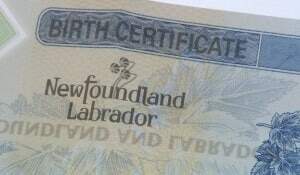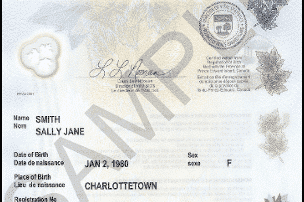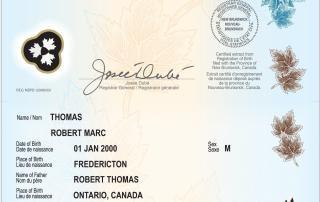Canadian Birth Certificate Apostille
As of January 11 2024, Canada has joined the Hague Apostille Convention. For a Canadian Birth Certificate to be officially recognized in countries that are signatories to the Convention, it now requires only an apostille. This simplification streamlines the process significantly for use in these countries. However, for countries not part of the Convention, the traditional process of authentication followed by legalization at the embassy of the foreign country where it will be used, remains necessary.
Our team, with 30 years of experience, continues to assist individuals in both processes: obtaining an apostille for countries under the Hague Apostille Convention, and the authentication and legalization (equivalent to an apostille in non-signatory countries) for others. This service is essential for various purposes, including visa applications, immigration, marriage, birth registration in foreign countries, and employment abroad.
Why You May Need It
Apostilling, authenticating, and legalizing a Canadian birth certificate are important steps in international document verification. These processes ensure that a document issued in one country is recognized as valid and official in another. Here are some reasons why you might need to have your Canadian birth certificate apostilled, authenticated, and legalized:
- Working Abroad: If you are planning to work in a foreign country, employers may require an apostilled or authenticated birth certificate to verify your identity and nationality.
- Studying Overseas: Many international educational institutions require authenticated documentation for enrollment. This includes birth certificates, especially for programs that have age restrictions or need to verify your date of birth.
- Marriage in a Foreign Country: If you plan to get married abroad, the local authorities might require an apostilled or authenticated birth certificate to process marriage documents.
- Immigration Purposes: When applying for residency or citizenship in another country, a legalized birth certificate is often a necessary part of the application process to establish your identity and nationality.
- Legal Matters: For international legal cases, such as inheritance or custody disputes, an authenticated birth certificate might be required to establish relationships and nationalities.
- Business Transactions: For certain international business transactions or when establishing business operations overseas, company representatives may need to provide authenticated personal documents, including birth certificates.
- Adoption Processes: In international adoption processes, authenticated birth certificates of the adoptive parents are usually required as part of the dossier.
- Dual Citizenship: If you are applying for dual citizenship, many countries require an apostilled or authenticated birth certificate from your country of origin.
- Consular Needs: Sometimes, for dealings with a foreign consulate or embassy (like visa applications), you may need to present an apostilled or authenticated birth certificate.
- Driver’s License or ID Applications Abroad: Some countries require an apostilled or authenticated birth certificate for issuing a driver's license or national ID to foreign nationals.
Make Sure You Have the Right Birth Certificate for the Process
It is vital to have the right type and size of Birth Certificate. Visit our Document Resources page for details on ordering a new birth certificate from provincial government vital statistics departments. Some departments provide direct delivery to our office for expedited processing.
How do I get an Apostille for a Canadian Birth Certificate?
The process of apostille, authentication, and legalization essentially verifies the legitimacy of the document for international use, ensuring it is recognized in countries that are members of the Hague Apostille Convention or have bilateral agreements with Canada. Each country has its own requirements and procedures, so it's important to understand the specific needs of the country where you intend to use the document.
Choosing the Correct Government Service for You
The other crucial step is choosing the correct process for the apostille or authentication of your Canadian Birth Certificate to ensure its validated correctly for international use. This step can be confusing as it depends on what province it was issued in as it could be Global Affairs Canada or one of the designated provincial authorities.
Global Affairs Canada Apostille Services
Global Affairs Canada is responsible for the apostille or authentication of Birth Certificates issued in specific provinces and territories. It is important to note that Birth Certificates from these provinces should be processed by Global Affairs Canada. This includes any Birth Certificate issued or notarized in the following provinces and territories:
- Manitoba
- New Brunswick
- Newfoundland and Labrador
- Northwest Territories
- Nova Scotia
- Nunavut
- Prince Edward Island
- Yukon
Provincial Apostille Services
Certain Provincial Competent Authorities will be responsible for the apostille or authentication of birth certificates issued in their respective regions. These include Alberta, British Columbia, Ontario, Quebec and Saskatchewan. Although there are exceptions to the rule if the document is a notarized copy or upon other factors which is another great reason to hire a professional service, so you get it right the first time.
Birth Certificate Authentication and Legalization for Non-Apostille Countries
1
Step 1: Authentication
The first step of authentication takes place at the respective competent authority. They will verify the certificate style, live birth registration, and the new type of Birth Certificate on polymer paper. However, the wallet-sized birth certificate cannot be authenticated as it is too small. In this case, you must order a new larger Birth Certificate from the provincial vital statistics department. Our team will help you determine if you have the correct type of Birth Certificate for authentication.
2
Step 2: Legalization
The second step of legalization takes place at the embassy or consulate of the foreign country, where a fee is charged for document legalization services. Our document legalization services will ensure that your birth certificate meets all requirements and is legalized correctly and efficiently, and we can return it to you or anywhere in the world it needs to go.
How Does Using Global Document Solutions Services Benefit You?
Utilizing a professional service for the apostille or authentication of birth certificates offers significant advantages. Professionals are well-versed in the intricacies of these processes, ensuring that your documents comply with all legal requirements. This reduces the risk of errors and delays, which can be crucial for time-sensitive matters. When these tasks are not handled by experts, there's a higher likelihood of mistakes such as improper documentation or missing critical steps, leading to prolonged processing times or outright rejection. In the realm of official documentation, accuracy and adherence to protocols are paramount, and professional services provide the expertise and peace of mind that these aspects are thoroughly managed. Talk to one of our experts today!
FAQ’s
The simple answer is Yes as of January 11, 2024. To make sure the process is done correctly depends on where it was issued.
The countries that will request that you get an Apostille include:
A
- Albania
- Andorra
- Antigua and Barbuda
- Argentina
- Armenia
- Australia
- Austria
- Azerbaijan
B
- Bahamas
- Bahrain
- Barbados
- Belarus
- Belgium
- Belize
- Bolivia
- Bosnia and Herzegovina
- Botswana
- Brazil
- Brunei Darussalam
- Bulgaria
- Burundi
C
- Cabo Verde
- Canada
- Chile
- Colombia
- Cook Islands
- Costa Rica
- Croatia
- Cyprus
- Czech Republic
D
- Denmark
- Dominica
- Dominican Republic
E
- Ecuador
- El Salvador
- Estonia
- Eswatini
F
- Fiji
- Finland
- France
G
- Georgia
- Germany
- Greece
- Grenada
- Guatemala
- Guyana
H
- Honduras
- Hong Kong
- Hungary
I
- Iceland
- India
- Indonesia
- Ireland
- Israel
- Italy
J
- Jamaica
- Japan
K
- Kazakhstan
- Kosovo
- Kyrgyzstan
L
- Latvia
- Lesotho
- Liberia
- Liechtenstein
- Lithuania
- Luxembourg
M
- Macau
- Malawi
- Malta
- Marshall Islands
- Mauritius
- Mexico
- Moldova
- Monaco
- Mongolia
- Montenegro
- Morocco
N
- Namibia
- Netherlands
- New Zealand
- Nicaragua
- Niue
- North Macedonia
- Norway
O
- Oman
P
- Pakistan
- Palau
- Panama
- Paraguay
- Peru
- Philippines
- Poland
- Portugal
R
- Romania
- Russian Federation
S
- Saint Kitts and Nevis
- Saint Lucia
- Saint Vincent and the Grenadines
- Samoa
- San Marino
- São Tomé and Principe
- Serbia
- Seychelles
- Singapore
- Slovakia
- Slovenia
- South Africa
- South Korea (Republic of Korea)
- Spain
- Suriname
- Sweden
- Switzerland
T
- Tajikistan
- Tonga
- Trinidad and Tobago
- Tunisia
- Turkey
U
- Ukraine
- United Kingdom
- United States of America
- Uruguay
- Uzbekistan
V
- Vanuatu
- Venezuela
List of Countries you will need to use the Authentication and Legalization Process for a Canadian Document
For your reference, we have provided a list of countries that have not ratified the Apostille Convention. It is your responsibility to verify the accuracy of this information.
- Afghanistan
- Algeria
- Angola
- Bangladesh
- Benin
- Bhutan
- Burkina Faso
- Cambodia
- Cameroon
- Central African Republic
- Chad
- Comoros
- Congo
- Côte d'Ivoire
- Cuba
- Democratic People's Republic of Korea
- Democratic Republic of the Congo
- Djibouti
- Egypt
- Equatorial Guinea
- Eritrea
- Ethiopia
- Gabon
- Gambia
- Ghana
- Guinea
- Guinea-Bissau
- Haiti
- Iran
- Iraq
- Jordan
- Kenya
- Kiribati
- Kuwait
- Lao
- Lebanon
- Libya
- Madagascar
- Malaysia
- Maldives
- Mali
- Mauritania
- Micronesia
- Mozambique
- Myanmar
- Nauru
- Nepal
- Niger
- Nigeria
- Papua New Guinea
- Qatar
- Rwanda*
- Sierra Leone
- Solomon Islands
- Somalia
- South Sudan
- Sri Lanka
- Sudan
- Syria
- Thailand
- Timor-Leste
- Togo
- Turkmenistan
- Tuvalu
- Uganda
- United Arab Emirates
- Tanzania
- Viet Nam
- Yemen
- Zambia
- Zimbabwe
* The Apostille Convention will come into effect in Rwanda on June 5, 2024.
As Canada's leading authorities, Global Document Solutions is equipped to expedite the preparation of a Canadian Death Certificate for global use, leveraging our 30 years of experience and current knowledge of Global Affairs Canada and Embassy regulations. Global Document Solutions service extends beyond swift document processing; we strive to simplify the procedure by guiding you through each stage, providing real-time updates on your document's status through our Online Status Tracker. Consult with one of our experts on international acceptance of the Death Certificate and leverage our expertise for your benefit.
No, as per the rules and regulations, only an original Death Certificate issued by a Canadian Provincial Vital Statistics Department can be authenticated. A notarized or certified copy made by a Canadian Notary Public cannot be apostilled or authenticated.
There are two different styles of Canadian Death Certificates such as the certificate size or the long form certified copy of the registration of death. Both come as certified true originals from the provincial Vital Statistics department. It's important to remember that the one you got from the Funeral Director or Funeral Home is not an official death certificate. The provincial statistics department of the province where the death took place issues the official death certificate. If you need to order a Death Certificate you can find links on our resources page on how to do it.
A Canadian Death Certificate is initially only valid for use in Canada therefore a foreign country will not accept a Canadian Death Certificate. To make the Death Certificate valid for use in a foreign country, it will first need to go through either the process of Apostille or Authentication and then if authenticated it needs Legalization at the Embassy Consulate of the country in which the document will be used. In both cases the authenticity of the foregoing signature is verified, effectively making the document valid for use in that foreign country. Some countries might ask you to get the Death Certificate Apostilled since that is the process most used in that foreign country. Since Canada has signed the Hague Apostille Convention, we now issue Apostille Certificates for use in member countries.
Most Vital Statistics Departments have an option to have the Death Certificate sent directly to a third party such as Global Document Solutions. Once you have been in contact with one of our agents regarding your request and confirmed how you want to proceed, we will provide you with our mailing address where the Death Certificate can be sent. A few Vital Statistics Departments, such as the Quebec État Civil, do not allow the Death Certificate to be sent directly to a third party. In this case the Death Certificate will need to be delivered to you first, then you can send it to us for Apostille or Authentication and Legalization.
If you have never ordered a Canadian Death Certificate, you have misplaced or lost the Death Certificate, the original you have is damaged, you can order a new or a replacement Death Certificate from the Provincial Vital Statistics Department in the province where the death took place. You can find links to the various vital statistics departments on our document resources page.




